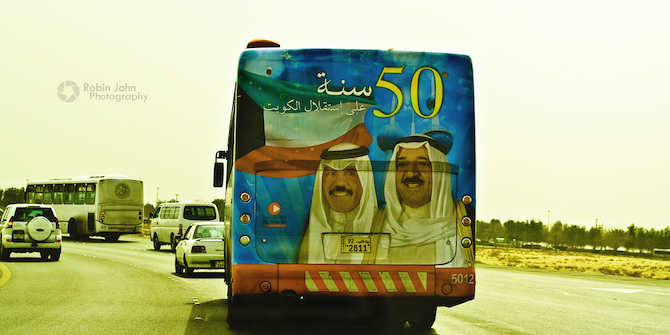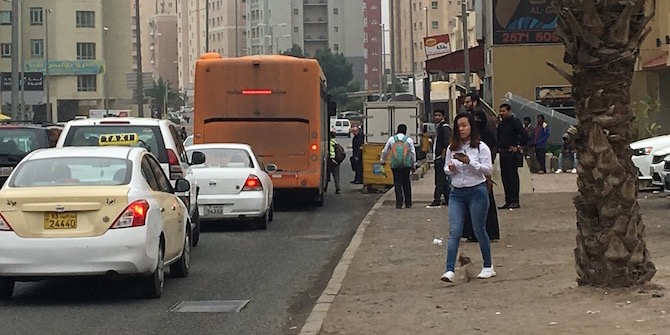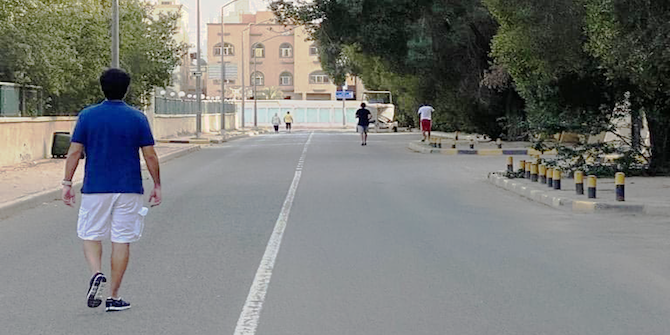By Jassim Al Awadhi and Geoffrey Martin

Night view of Kuwait City. Source: Cajie, Flickr
Kuwait needed rapid changes to its public transportation system before the COVID-19 pandemic. For the last few years, the authors have warned that a city-state like Kuwait, with unsustainable and unplanned urban sprawl, needs to provide safer and more efficient public transport. All of this was and is possible, with the buses, personnel, and infrastructure available to enact quick reforms.
Like many of the challenges in Kuwait, the issues are related to a lack of political will, a disaffected public, and a bureaucratic nightmare when it comes to creating effective transport policy and implementing it. Much of the authors’ earlier warnings came from the realisation that Kuwait would need to adapt to a modern transportation system due to the eventuality of a post-oil future which appears closer than ever before. COVID-19 accelerated this by many years, bringing to the fore many of the issues that make such reform paramount, including a fiscal crisis brought on by low oil prices and an undeveloped private sector, which is unable to pick up what the public sector cannot. With talk of a metro becoming an even more distant dream as oil revenues plummet and no official deadline for completion, government agencies need to act quickly to reorient their approach to transportation in these trying times.
Differing curfew methods, from partial curfews in March and April to a full lockdown for most of May, and a continuing health crisis highlight many of the key challenges to a country when it does not have adequate transportation and pedestrian infrastructure. With buses and taxis stopped for health reasons for most of April until August, employers and employees struggled to maintain business operations at the very time they were most needed. Stopping taxis, in particular, was a major problem, forcing people to walk, especially in many inner neighbourhoods where there are no bus routes. With no easily accessible public infrastructure for pedestrians in the country, especially during the 50-degree heat, this situation was untenable for most of the summer and many people lost their jobs and salaries for an extended period.
Our research indicates that taxi services in Kuwait have many regulatory issues that need to be fixed, now more than ever. Taxi drivers have no formal training in Kuwait, often coming to the country through visa traders. They do not have the finances to seek such training privately. There is also no control over licensing of taxi companies; quotes for the number of companies, vehicles, or types of taxis; and no regulations on metered fees or on the roles and responsibilities of drivers and passengers. The Ministry of Interior (MOI) periodically opens and closes issuance of licenses with no explanation given. There are also no mileage metrics helping companies to assess how many vehicles they need or what the demand for taxis is. Applications like Uber have not been able to enter the market, and its regional subsidiary Careem was shut down in Kuwait in late 2019 due to regulatory issues, only coming back to the streets in November 12, 2020.
Taxis are regulated by the MOI and, according to the numbers available, there were 16,626 taxi vehicles registered in 2017. There are no available numbers of how many people work as taxi drivers, but we estimate it is in the tens of thousands and largely unregulated. While the Public Authority for Roads and Transportation (PART) was handed responsibility for taxis in 2014 to better regulate the transport system, no clear decisions about taxi regulations have been announced since then. This is largely because PART does not have proper staff or the organisational structure of a government agency. It is also not regulated by the Civil Service Commission either, making it difficult to hire Kuwaiti nationals or find the right technical expertise needed. What Kuwait needs is a unified taxi service, like the framework that exists in Transport for London in the UK, but without a government body capable of implementing this, no major changes can occur.
Stopping buses during the March-August period also illustrated many of the same issues with current transport policies, or more aptly, the lack thereof. Again, with no centralised regulator and no clear guidelines, the most common outcome has been more suffering for commuters. This is due to the distorted incentive structure for drivers. While Kuwait Public Transport Company (KPTC) has excellent training for its drivers, there has been no change to the salaries of 150 to 180 Kuwaiti Dinars per month since the 1980s, leaving a huge gap between salary and living expenses. Instead of increasing salaries, drivers are given bonuses for ticketing. This leads to all kinds of problems, including drivers aggressively picking up commuters off-route, competing with other buses for passengers, and pushing drivers to work extra hours, often doubling shifts illegally to make enough income. In comparison, private companies such as CityBus pay KWD 350–450 for drivers. However, private sector companies struggle with an inability to develop better routes, as well as direct their buses to the most profitable ones as KPTC still manages all routes which have not changed significantly in decades, even though the cityscape has.
It makes more sense and would be cost-effective for KPTC to act as a regulator and subcontract to private companies (like in London, UK). It would also help to create accessibility to new neighbourhoods, which are currently not on many bus routes. New lines in new neighbourhoods, such as South Surra, sit unused. Neighbourhoods that used to have services, like the Abdullah Al Salem area, were stopped because the fumes from the type of diesel, Euro-III, utilised in public buses, led the local cooperative society to launch a petition against them. Newer diesel types, such as Euro-V, are much better, reducing the hazard and constituting a more environmentally friendly choice. While Kuwait National Petroleum Company (KNPC) was supposed to change the fuel to Euro-V as part of the Clean Fuels Project, it has not done so. KNPC is the only legal provider of fuel for public and private transportation in Kuwait so until they move forward, there is no way to alter this.
Not all is lost. ‘Solo’ transport has many benefits during difficult economic times, making savings on health, infrastructure and economic development and benefitting real estate, hospitals and other businesses. The lack of regulation in public transport makes this even more important as past practices, especially after COVID-19, are not economical, nor sustainable.






